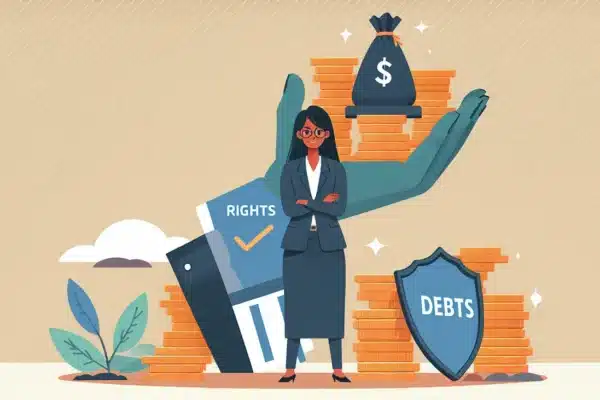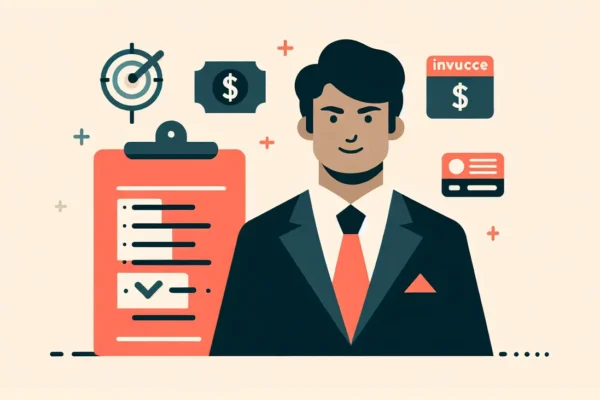In the world of B2B, debt collection can often seem like a daunting and complex process. However, it is an essential part of maintaining healthy business relationships and ensuring steady cash flow. In this guide, we’ll break down the nuances of B2B debt collection in a straightforward and approachable way.
The Basics of B2B Debt Collection
Before diving into strategies, it’s important to understand what B2B debt collection entails. Unlike consumer debt collection, B2B focuses on collecting payments between companies for goods or services provided, often involving larger sums and more complex agreements.
To start, it’s useful to know why B2B debt collection exists in the first place. Businesses often deal with credit terms as a standard part of their operations, offering goods or services upfront with the understanding that payment will follow later. This flexibility helps in building business relationships by allowing clients some breathing room to manage their own cash flows before settling the dues. However, when payments don’t arrive on schedule, it creates a need for a structured approach to collections.
At its core, B2B debt collection is about ensuring that the agreed financial obligations are met without damaging the professional relationships involved. It requires diplomacy, patience, and, sometimes, persistence to balance these goals. The stakes can be high as unresolved debts can significantly impact cash flow, affecting a company’s ability to meet its own obligations. Thus, understanding the basics helps in laying down a path for effective management of receivables.
Common Challenges and Misconceptions
There are several misconceptions about debt collection in a B2B context, such as the belief that it inevitably strains business relationships. We’ll explore these challenges and debunk common myths to pave the way for more effective practices.
One common challenge businesses face in B2B debt collection is the notion that being firm about payments might jeopardize future dealings. This is largely a misconception. In reality, many companies recognize and respect the necessity of a structured collection process. When handled professionally, debt collection can even reflect positively on a company’s efficiency and business acumen.
Another widespread myth is that pursuing debt collections is always antagonistic. In fact, successful debt collection often relies on understanding and communication. By approaching debt collection as a joint problem-solving exercise rather than merely a demand, businesses can work alongside their clients to come to an agreeable resolution. This proactive and cooperative approach not only aids in quicker payment turnaround but also strengthens partnerships built on trust and mutual understanding. Clearing up these misconceptions is critical as doing so can unlock more constructive strategies in managing outstanding debts.
Effective Communication: The Key to Success
Establishing clear and open lines of communication is vital. Setting expectations early, sending timely reminders, and being transparent about payment terms can prevent misunderstandings and foster a cooperative atmosphere.
Communication serves as the backbone of a successful debt collection strategy. Imagine starting a partnership with ambiguous terms—it’s a recipe for confusion. By laying out clear payment terms right from the beginning, businesses set the stage for clear expectations. Timely communication, such as reminders about upcoming due dates or payment confirmations, can also work wonders in keeping the payment schedule on track.
Beyond clarity, the tone of communication matters greatly. When friendly yet professional, it builds a rapport that eases collaboration. If a payment issue arises, having an established friendly rapport makes it easier for the debtor to be transparent about their challenges and for the collector to negotiate terms that are mutually beneficial. This rapport forms the foundation for discussing more sensitive issues, like payment delays or restructuring debts. It’s these conversations that, when handled skillfully, maintain business relationships and even improve them.
Strategies for Successful Collections
Implementing proven strategies such as flexible payment plans, early payment incentives, and leveraging technology can improve the likelihood of successful debt recovery without damaging client trust.
Flexible payment plans come in handy, particularly in periods of unexpected financial strain for clients. Offering the option to repay in installments or restructure payment terms helps in accommodating clients’ current cash flow situation, thus enabling them to pay back efficiently while keeping their operations afloat.
Incentives, such as discounts for early payments, can serve as a motivating factor for clients to prioritize settling accounts sooner. This practice not only bolsters cash flow but also shows clients that their timely payments are appreciated. On the technology front, adopting advanced software solutions can streamline invoicing and follow-up processes, minimize human error, and accelerate the overall collection cycle. Automated systems can schedule reminders and track payments, allowing for more consistent and less intrusive follow-ups.
Additionally, customizing strategies to fit different client profiles is crucial. Not all clients operate identically, and a personalized approach can lead to more positive outcomes. Tailoring communication style and negotiation tactics to the individual client’s situation allows for a more empathetic and effective interaction. In doing so, businesses not only increase their odds of timely debt recovery but also demonstrate their commitment to maintaining client-centric relations.
When to Seek Professional Help
Sometimes, involving a collection agency or legal counsel becomes necessary. Knowing when to escalate the situation can help protect your business interests while adhering to legal and ethical standards.
Reaching out to professional services should typically be seen as a last resort rather than a first plan of action. Collection agencies specialize in recovering outstanding debts, especially when the situation becomes untenable through standard efforts. They come with the expertise to handle tricky negotiations and have established procedures that can bring faster resolutions. Using them, however, means not exerting due diligence in initial internal efforts and communication strategies.
Legal counsel becomes critical when there are disputes over the terms of the agreement or when there’s potential for significant financial loss. Legal professionals can guide businesses through the intricacies of debt collection laws to ensure every step taken is compliant and in the best interest of the business. Timing is everything—seeking help too late might escalate the problem beyond manageable proportions. However, reaching out at the right point ensures legal/agency support complements internal efforts rather than replaces them prematurely.
That said, a partnership with debt collection professionals should be built on transparent communication and defined boundaries. Business owners should clearly articulate their strategies and goals, providing all necessary documentation for smooth operation. Carefully vetting these professionals also ensures that they align with your business ethos and approach to client relations. By integrating their expertise within the broader debt strategy, businesses can protect their cash flow effectively without compromising relationships.
Wrapping Up: Embracing Effective Debt Collection Strategies
Understanding B2B debt collection doesn’t have to be overwhelming. By implementing these strategies and maintaining open communication, businesses can manage debt collection effectively while preserving valuable partnerships.







